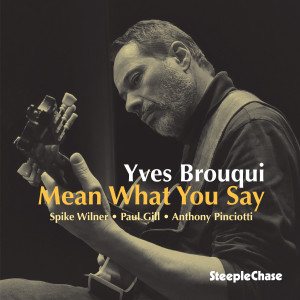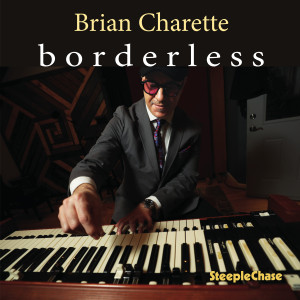 I don’t think you’ll hear a better new album of straight ahead guitar jazz this year than Yves Brouqui’s Mean What You Say. Brouqui has been playing professionally since he began in Paris in 1986, and since a long stint in New York in the ’90s has split his time between France and New York. He’s best known as a side player on both sides of the pond but Mean What You Say is something like his seventh leader date, and I think his first on Steeplechase.
I don’t think you’ll hear a better new album of straight ahead guitar jazz this year than Yves Brouqui’s Mean What You Say. Brouqui has been playing professionally since he began in Paris in 1986, and since a long stint in New York in the ’90s has split his time between France and New York. He’s best known as a side player on both sides of the pond but Mean What You Say is something like his seventh leader date, and I think his first on Steeplechase.
This album is a solid demonstration of swinging straight ahead jazz focused on hard bop styles. Brouqui plays his hollow body electric with classic tone, an ear for melody and a sure sense of rhythm on seven standards and a three originals. Kicking off with the swinging bop of Cedar Walton’s “Turquoise Twice” then easing into Thad Jones’s mid tempo “Mean What You Say,” we’re treated to a lovely solo flight by pianist Spike Wilner, and bassist Paul Gill brings an octave jumping, double stopping melodic turn just before the final coda.
Gill and drummer Anthony Pinciotti move things along nicely on “Stranger In Paradise,” an ultra-familiar pop standard from the musical Kismet. Another very familiar cover is the closer, Duke Ellington’s “Caravan,” here pushed in tempo as an urgent bop arrangement. The covers showcase Brouqui’s sharp arrangement chops, further highlighted by the delicious 5/4 bolero arrangement of “Besame Mucho” and the Latinized Cole Porter standard “Get Out Of Town.”
Brouqui’s own contributions include the delightful “Magali,” a rumba based on a traditional Occitan children’s song; the lush romantic ballad “Elsa Rose”; and the driving urbane blues of “Massena Boulevard.” Only “For John L,” an uptempo double-waltz number, is undistinguished to my ear.  Otherwise, Mean What You Say is an entertaining program of solid journeyman jazz.
Otherwise, Mean What You Say is an entertaining program of solid journeyman jazz.
For a little over 30 years Brian Charette has been playing and recording on the organ — backing a variety of pop and jazz singers and leading his own groups. According to noted jazz writer Scott Yanow in the liner notes to Borderless he’s the first and so far only to make a full jazz album of solo organ music, and this is now his third such album, all of them on Steeplechase.
Going by the evidence of this album and Yanow’s thorough notes, Charette is quite an eclectic player. You’ll find plenty of examples of the kind of jazz that other players of the Hammond B3 make, including a playful cover of Booker T’s “Hip Hug-Her” and a cool take on Tadd Dameron’s “Tadd’s Delight,” and especially Charette’s own swinging opening track “Minors Must Be Accompanied By Adults.” He lends his appropriately cool and dry vocals to the Antonio Carlos Jobim classic “Corcovado.”
But he takes an unusual approach, coaxing some highly creative sounds out of the organ on the standard “Willow Weep For Me,” and turns Huey Lewis’s ’80s hit “If This Is It” into a lush lounge excursion — pass the wine cooler! And on his own compositions “Ratios” and “Fractal,” nestled in the middle of the program, he mixes hymnal tonalities with mathematical patterns and (according to Yanow) Hungarian and Indonesian scales on the former; and hypnotic, minimalist repetition on the latter. Rhumba, bebop and more round out the program, making it much more varied and interesting than a solo organ album has any right to be.
